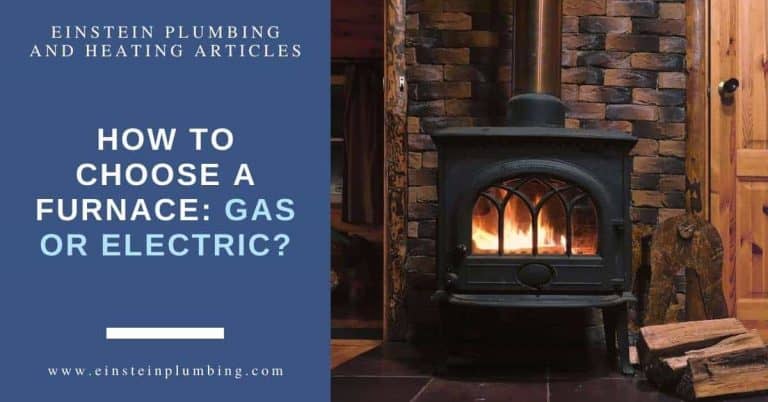How to Choose a Furnace: Gas or Electric?
There are many factors to consider when it comes to choosing whether to go for an electric furnace or gas furnace. There’s cost, efficiency, lifespan, and more. Also, take into account the safety of the installation as it will have an impact on your home and occupant.
The winter season has come to Oregon, Washington, and Nevada. If you are planning on replacing your old inefficient furnace or choosing one for your new home, the first decision you will need to make is whether you want a model that operates on gas or electricity.
The initial costs of the two are different, as are the operating costs and maintenance requirements. Also, when installing an electric or gas furnace, determining the size of the unit is very important. A size that is too small will not heat the home correctly.
One that is too large will turn on and off more often than necessary, causing the unit to need more routine maintenance.
Below, we review the differences of both gas and electric furnaces so you can make the right decision for your home.
Installation
There are a lot of DIY tips and instructions for installing gas and electric furnaces. However, it is best to leave this job to a professional HVAC technician.
The challenging part of installing a gas furnace is the safety factor in dealing with the combustive element, generally natural gas. The heat exchanger and other components must be sealed correctly to avoid carbon monoxide leakage, a deadly gas, from the unit.
The steps of installing a gas furnace require specialized equipment, tools, and knowledge that even a seasoned DIYer will not have. Plus, it is also time-consuming. A professional HVAC team can take a few days to install and set up a new unit completely.
The high voltage needed by the electric furnace is one of the reasons professional is the best choice for that type of installation.
The electric furnace needs heavy duty wiring to the electrical breaker box.
For you to ensure the safety of your home and family, all municipalities have strict inspection processes to secure all installations are accurate.
This issue is another reason to allow experts to do the work for you.
Heat and Energy Efficiency
An electric furnace is probably the most efficient of the two. It may have an annual fuel-utilization-efficiency (AFUE) rating as high as 100%, while gas furnaces ratings range from 55 to 79%.
The most significant factors to consider are the type of unit selected, and the amount of heat lost within a gas furnace flue or other parts.
You can achieve higher efficiency in a gas furnace by using an intermittent, direct spark, or hot surface ignition as an alternative to the traditional pilot light.
The higher cost of a more efficient gas unit will be offset by lower fuel costs in regions with harsh winters.
Costs
Electric furnaces are usually less expensive than gas furnaces and cheaper to install. The amount of a new electric furnace ranges from 500-2,000 dollars, while a gas furnace ranges from between 2,300 and 3,500 before installation.
For installation cost, electric furnace averages 1,150 dollars while installation of a gas furnace averages 1,500 dollars.
Despite the higher average efficiency and cheaper initial cost of electric furnaces, their operational costs are higher because of the price of electric power.
Even though the Energy Information Administration (EIA) expects the price of natural gas to increase over the next few years, it will still be significantly lower than electricity.
Maintenance Safety
An electric furnace is much easier to maintain and requires less professional care. A gas furnace, however, needs routine maintenance by HVAC specialists to keep it efficient and safe.
Only an HVAC specialist has the proper knowledge and equipment to ensure that all areas of the system are working safely and accurately.
Take note that improper maintenance may lead to carbon monoxide poisoning. All gas-burning appliances should be adequately ventilated and maintained to reduce this risk.
Also, homes with gas appliances should use carbon monoxide detectors as an added precaution.
Lifespan
Gas systems typically last about half as long as electric systems: 10-20 years for gas systems as opposed to 20-30 years for electric systems.
Noise
An electric furnace is usually quieter than a gas furnace.
Climate Considerations
A gas furnace will heat the home much faster because the heat produced is hotter than the heat generated by electric coils.
For this reason plus the cheaper cost of natural gas make gas heater a better option for colder climates.
In a warmer environment with less demand for heating, an electric furnace with its cheaper initial cost and fewer maintenance needs can serve a homeowner better.
If you need professional help in repairing, replacing, maintaining, and installing a gas or electric furnace in your Oregon, Washington, and Nevada home, Einstein Plumbing, Heating, and Cooling are the one you can call. Our professional HVAC technicians are all licensed and experienced to work with all kind of heating systems. We also provide plumbing, water heaters, sewer & mainlines, and much more.
Call us now at 888-671-7767 or email [email protected] to learn more about our services or to schedule your installation appointment.
You may want to check out our other plumbing articles:
- Fix Furnace Problems Caused by Thermostat
- Best Ways to Reduce Heating Costs this Winter
- Good Top Brands For Plumbing Tools and Fixtures
- Best Halloween Attractions in Oregon
- Halloween Plumbing Safety Tips
